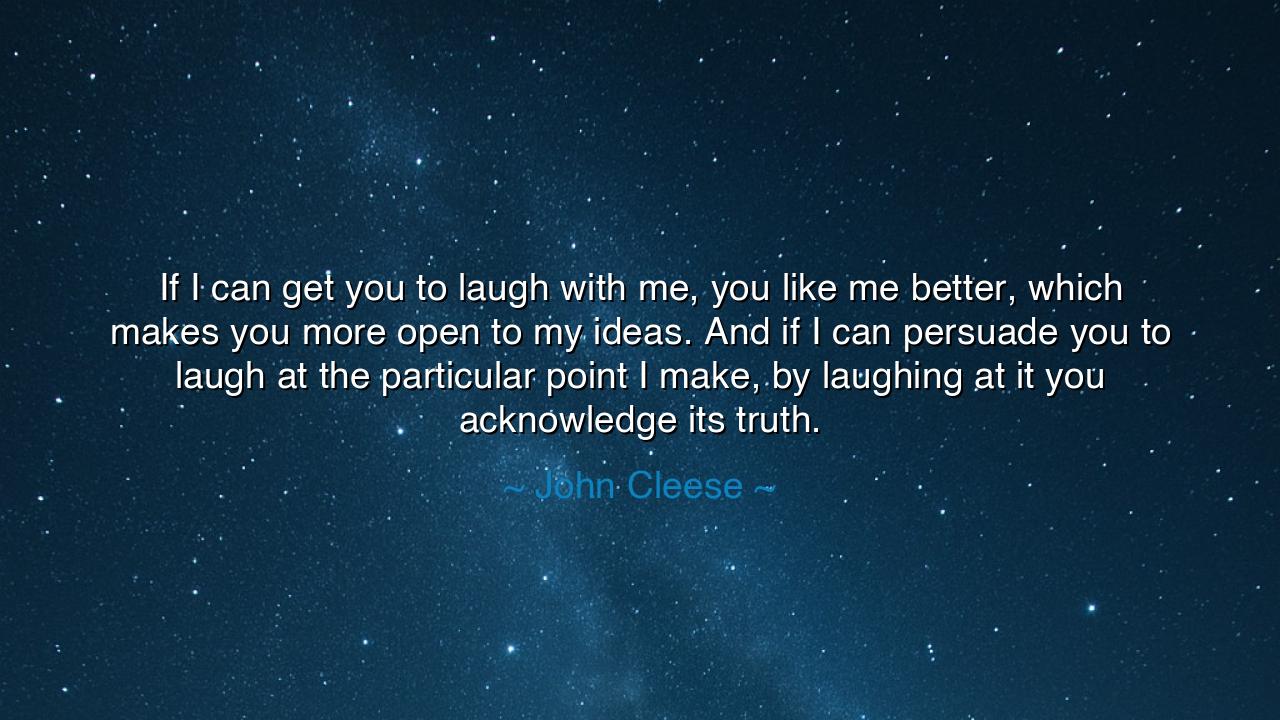
If I can get you to laugh with me, you like me better, which
If I can get you to laugh with me, you like me better, which makes you more open to my ideas. And if I can persuade you to laugh at the particular point I make, by laughing at it you acknowledge its truth.






Hear the clever and piercing words of John Cleese, master of wit and keen observer of the human heart: “If I can get you to laugh with me, you like me better, which makes you more open to my ideas. And if I can persuade you to laugh at the particular point I make, by laughing at it you acknowledge its truth.” In these words, he unveils the hidden power of laughter, not merely as a source of amusement, but as a bridge between souls, a weapon of persuasion, and a mirror of truth itself.
The ancients knew well that the art of persuasion is not won by force alone, but by charm, wit, and shared humanity. Aristotle spoke of pathos, the stirring of emotion, as one of the great pillars of rhetoric. Laughter disarms suspicion, softens pride, and draws men closer together. In laughter, barriers fall, and even the hardest heart is moved to listen. Cleese reveals that laughter is not trivial, but a gate through which truth may enter unopposed.
History gives us many examples. Consider the speeches of Abraham Lincoln. In the midst of civil war, with a nation bleeding and divided, he often used humor in his addresses. His jokes, light yet pointed, made enemies less hostile and friends more loyal. By laughter, he captured attention; by laughter, he smuggled truth into weary hearts. In the end, those who laughed with him were already half-persuaded, for their laughter was a kind of surrender to the reality he revealed.
Think too of Winston Churchill, standing before Britain in her darkest hour. His speeches thundered with courage, but they also sparkled with wit. When told that Hitler called him “the most dangerous man in Europe,” he quipped, “That’s quite right—and I think so too.” The people laughed, and in that laughter they were united, comforted, and made more open to his call to resist. The truth—that they must endure against impossible odds—was softened by humor, so it could be borne without despair.
Why does laughter carry such power? Because it is an act of agreement. To laugh at a point is to admit its sharpness. The heart may resist sermons, and the mind may resist arguments, but both are caught unawares by humor. In laughter, pride loosens, and the soul confesses: “Yes, this is so.” Thus Cleese teaches us that truth can ride upon the wings of comedy, reaching places where logic alone cannot go.
The lesson for us is this: do not despise humor as a mere distraction, nor scorn laughter as weakness. Learn to use it wisely, as balm and as blade. When you wish to persuade, find a way to lighten the heart of your listener. When you wish to speak a difficult truth, wrap it in humor so it may be received without bitterness. But wield this power with care: never mock to wound, never joke to deceive, but let your laughter always serve compassion and clarity.
Therefore, remember this wisdom: laughter is not the enemy of truth, but its ally. To make another laugh with you is to invite them into fellowship; to make them laugh at a truth is to help them embrace it. So live as one who does not only argue but also delights, not only teaches but also gladdens. For the one who can wed truth to laughter possesses a power both gentle and irresistible, a power to change hearts without breaking them.






LTQuynh Dan Luu Thi
This idea that humor can make people more open to ideas is fascinating. It’s like disarming someone with a joke before introducing your point, which could make them less defensive. But does this mean humor is always a more effective tool than direct argument? Is it possible that in some situations, humor could undermine the seriousness of a message, or does it depend entirely on the context and audience?
MHNguyen Minh Hue
I’ve always thought humor could be a great way to break down barriers, and Cleese’s quote really highlights that. By making someone laugh at a point you’re making, it seems like you’re not just presenting an idea, but allowing them to accept it in a less confrontational way. Do you think that humor can be a shortcut to truth? Or is there a risk that it oversimplifies or trivializes important issues?
TTThanh Ngan Tran T
This quote really makes me think about how powerful humor can be in communication. It’s true that when we laugh, we tend to let our guard down, which could make us more open to accepting new ideas. But I wonder, can laughter ever be forced? If humor doesn’t feel genuine, does it still have the same impact on persuasion? How do we ensure that humor enhances, rather than detracts from, the message we’re trying to convey?
Jjenny
I really like the way John Cleese connects humor with persuasion. It makes sense—when we laugh with someone, it does create a sense of connection, which can make us more receptive to their ideas. But does this mean that humor is always a tool for persuasion? Or are there times when it might backfire, making people feel like they’re being manipulated instead of genuinely entertained?